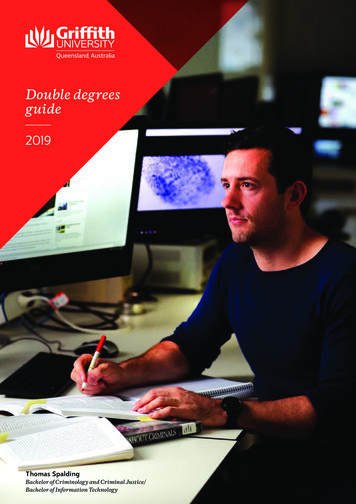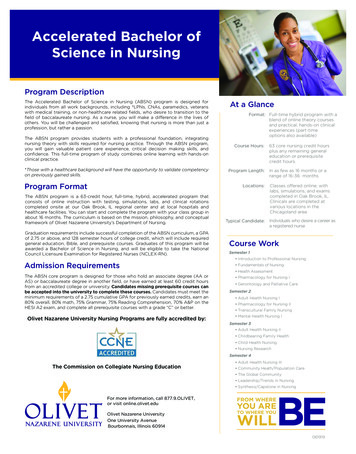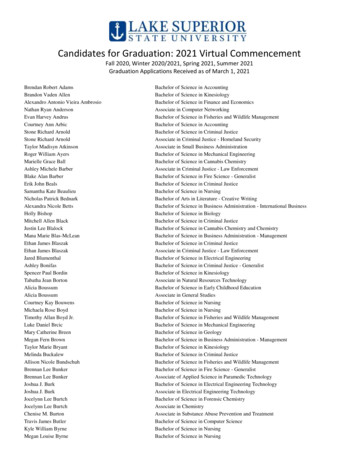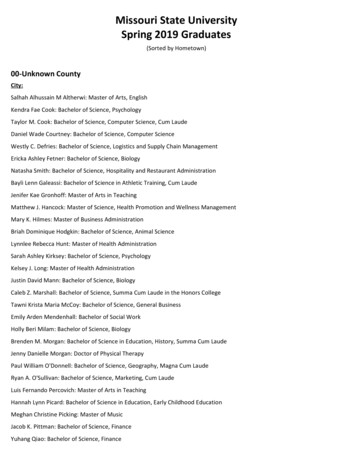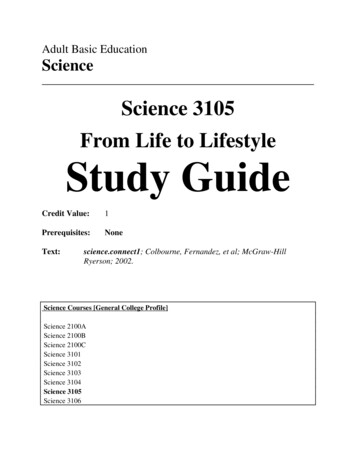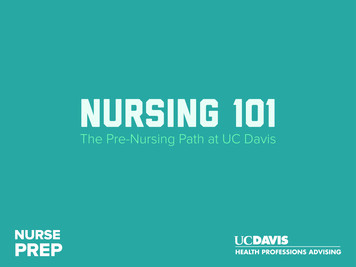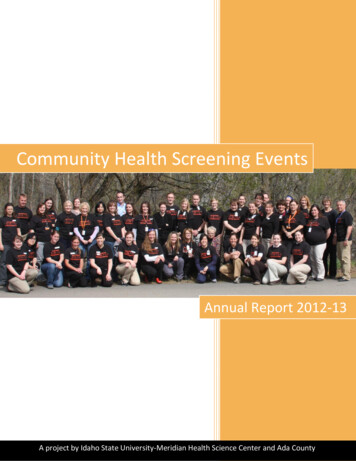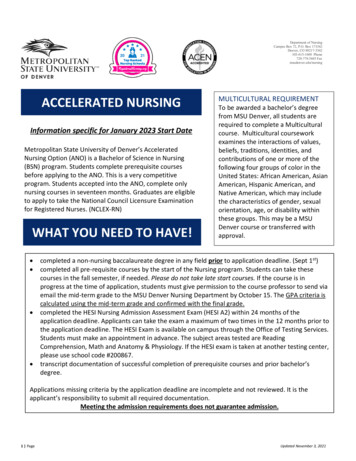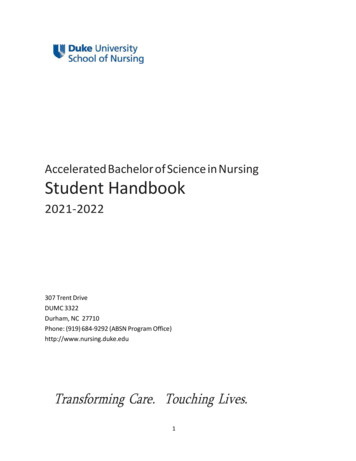
Transcription
Accelerated Bachelor of Science in NursingStudent Handbook2021-2022307 Trent DriveDUMC 3322Durham, NC 27710Phone: (919) 684-9292 (ABSN Program Office)http://www.nursing.duke.eduTransforming Care. Touching Lives.1
SPECIAL NOTICE FOR ACADEMIC YEAR 2021-2022:As we begin the 2021-2022 Academic Year, we recognize that we are still in the midst of a global pandemic andhave taken great care to design academic experiences that adhere to our Guiding Principles for dealing withCOVID-19: Safety first, Protecting the health of our community and our ability to care for patients, Advancing academic mission, Aligned with local and state ordinances, Consistent with guidance from our local and national health authorities, Responsive and adaptive to an evolving environment.Our academic calendars have been amended to meet the needs of the students in each of the academic programs.Refer to the DUSON Resources to Support Students section in this handbook as well as the School of Nursing website for more detailed information. Updates to the website will be made as changes occur and these changes willalso be communicated directly to students.About this handbook:This handbook is designed to be a ready resource for you during the course of your ABSN studies at the DukeUniversity School of Nursing, and as such is designed for currently enrolled ABSN students. Other degree programswithin the School of Nursing have separate handbooks. For information about those other degree programs, pleaseconsult either the Bulletin of the Duke University School of Nursing or the DUSON website.Changes will be made to the electronic version of the handbook as they occur. Consult the electronic copy for themost current information.2
Table of ContentsSpecial Notice of Academic Year 2021. 2About This Handbook 2Table of Contents.3Dean’s Welcome . .6Assistant Dean’s Welcome . . 6Academic Calendar 2021-2022 . .7Offices . .7Academic Programs . .71. Duke University School of Nursing 81.1 Philosophy . .81.2 Mission Statement . .91.3 Strategic Areas of Focus . .91.4 Statement of Diversity and Inclusion.91.5 Core Values .102. Academic Integrity . .102.1 The Duke Community Standard . . 102.2 Personal Integrity Policy and Guidelines for DUSON Students. . 102.3 Civility and Professional Conduct . .112.4 Dispute Resolution . .113. Academic Programs . .113.1 Overview of the Accelerated Bachelor of Science in Nursing Program .113.1.1 Program Description . .113.1.2 End-of-Program Outcomes . .113.2 ABSN Curriculum .124. Academic Policies and Procedures . .124.1 Overview . .124.1.1 Organization of this Section. .124.1.2 Confidentiality and Release of Student Records . .124.2 Student Progression with Course of Study .124.2.1 Student Enrollment Status . .124.2.2 Academic Advisement .124.2.3 Academic Probation and Academic Warning . .134.2.4 ABSN Learning Improvement Plan . .134.2.5 Attendance . .134.2.6 Religious Observance and Holidays . .144.2.7 Course Format Definitions . .144.2.8 Grades . .144.2.9 Adding, Dropping, or Withdrawing from a Course . .153
4.2.10 Transfer of Credits .164.2.11 Time for Completion of Degree . 164.2.12 ABSN-MSN Early Decision Option . 164.3 Separation from the School of Nursing. 164.3.1 Leave of Absence. 164.3.2 Withdrawal from the School of Nursing. 174.4 Clinical Placements and Activities. 184.4.1 Assignment of Clinical Placements . 184.4.2 Clearance Requirements for Clinical Experiences . 184.4.3 Guidelines for All Clinical Experiences . 204.4.4 Clinical Appearance and Attire Policy .204.4.5 Attendance at Clinical Experiences . 224.4.6 Exposure to Potentially Hazardous Substances . . . 234.4.7 Guidelines for Student Global Cultural Immersion and Service-Learning Experiences . .234.5 Degree Completion and Graduation . 244.5.1 Intent to Graduate. 244.5.2 Student Assessment and Program Effectiveness. 244.5.3 Graduation and NCLEX-RN Testing . 244.6 Graduate Recognition and Commencement . 254.6.1 School of Nursing Hooding and Recognition Ceremonies . 254.6.2 Duke University Commencement Exercises . 254.6.3 Diplomas . 265. Non-Academic Policies and Procedures . .265.1 Duke University – Tobacco Free Campus Policy . 265.2 Alcohol / Drug Policy . 265.3 Student Disability Access Office: Reasonable Accommodations Process . .265.4 Duke University Office for Institutional Equity .275.5 Duke University Non-Discrimination Statement .275.6 Communication Between Duke University and Students .285.7 Use of Social Media .285.8 DUSON Student Flu Policy . 286. Resources – Duke University . .306.1 Duke Student Health Services . 306.2 Student Mental Health Services . 306.3 Safety . 316.4 Duke University Police . 316.5 Sexual Assault Support Services . 316.6 Duke University Student Affairs . 316.7 Graduate and Professional Student Council . 326.8 The Libraries .326.9 The Duke University Medical Center Library (DUMCL) . 327. DUSON General Information .334
7.1 Building Access .337.2 Student Identification Cards . . 337.3 Parking . . .337.4 ePrint . . . .337.5 Name and Address Change . . . .337.6 Technology Support .348. DUSON Resources to Support Students .349. DUSON Student Organizations . .349.1 Sigma Theta Tau –Beta Epsilon Chapter . .349.2 Duke University School of Nursing Student Ambassadors . .349.3 Duke University School of Nursing Student Council . .349.4 American Assembly for Men in Nursing – Duke Chapter . .359.5 Duke Emergency Nursing Students .359.6 Duke Nursing Students without Borders . .359.7 DUSON Spectrum . 359.8 Fusion: Multicultural Nursing Student Association . 359.9 National Student Nurses Association – Duke Chapter .359.10 Nightingales .369.11 Nurses Christian Fellowship . .359.12 Active Minds: Nurses for Mental Health Awareness .359.13 Nature vs. Nurses .359.14 Women’s Health Organization 359.15 Neonatal and Pediatrics Students .35AppendicesAppendix A.1: Personal Integrity Policy for Duke University School of Nursing Students 36Appendix A.2: Duke University School of Nursing: Student Integrity Guidelines .40Appendix B: Duke University School of Nursing: Student Complaint and Dispute ResolutionProcess for Academic Issues .43Appendix C: Duke University School of Nursing: Violation of Duke Community Standard orSchool of Nursing Personal Integrity Policy .46Appendix D: ABSN Curriculum . .49Appendix E : ABSN Learning Improvement Plan .505
Dean’s WelcomeWelcome to the Duke University School of Nursing.We are very happy that you have chosen Duke University for your nursing education and welcome you to theDUSON family! Whether this is your first semester with us or your last, it is my hope that this handbook will be agreat resource for you.At the Duke University School of Nursing, we pride ourselves on our diverse community of scholars and ourcutting-edge programs. As one of the leading nursing schools in the country, we believe that the educationalenvironment we have fostered and continue to build upon will prepare you to put your passion into practice.Since the founding of our school in 1931, Duke University School of Nursing has prepared outstanding clinicians,educators and researchers to lead in all sectors of the nursing profession. We look forward to you joiningthose Duke alumni who have provided or are currently providing the highest quality evidence-based health careand nursing education throughout the world.I encourage you to take the time to familiarize yourself with this handbook. Within these pages you will learnabout the DUSON philosophy, academic policies and procedures and how they pertain to your individual needsas a student. Information about clinical requirements and the many offices and resources available to youthrough the school, as well as important student services, are described. You will also find information pertainingto your particular program of study, including course information and contacts that will be of use to you duringyour time at Duke.If you have additional questions, your faculty advisor, program faculty and staff and the staff in the Office ofAdmissions and Student Services are available and willing to help you. Comments or suggestions for futureupdates of the handbook are welcomed and should be forwarded to Debra Mattice (debra.mattice@duke.edu)in the Office of Academic Affairs.On behalf of the DUSON administration, faculty and staff, welcome to Duke!Vincent Guilamo-Ramos, PhD, MPH, LCSW, RN, ANP-BC, PMHNP-BC, AAHIVS, FAANDean of the School of Nursing; Vice Chancellor for Nursing Affairs, Duke UniversityAssistant Dean’s WelcomeAs the ABSN Program Assistant Dean, I would like to add my warmest welcome to Duke University School of Nursing (DUSON). We are honored that you chose DUSON to begin your journey to become a professional nurse, andwe look forward to seeing what gifts and talents you bring to our program and to the profession of nursing. Ourexceptional faculty and staff look forward to supporting your education in a variety of learning spaces including theclassroom, in our state-of-the-art simulation and lab center, and in clinical settings across the Triangle and theglobe. I encourage you to utilize all the resources that DUSON and Duke University have to support your success inour Program. Please don’t hesitate to reach out to myself, your advisor, your faculty, or our staff to support you onthis exciting journey to nursing.Sincerely,Michelle Hartman DNP, RN, CPNPAssistant Professor and Assistant Dean, ABSN Program6
Academic CalendarFor the 2021-2022 Academic Year, the School of Nursing has four Academic Calendars: one for the ABSN Program; onefor Graduate Programs (MSN and DNP, excluding Nurse Anesthesia students); one for Nurse Anesthesia DNP studentsand one for PhD students. Consult the appropriate Academic Calendar for information regarding the academic year(i.e., semester beginning and ending dates, registration windows, holidays, etc.) The Graduate School Academic Calendar is available here.OfficesOffice of Academic AffairsDean’s OfficeValerie M. HowardVice Dean for Academic AffairsPhone: (919) 613-7162email: valerie.howard@duke.eduVincent Guilamo-RamosDean of the School of Nursing;Vice Chancellor for Nursing Affairs, Duke UniversityPhone: (919) 684-9444email: vincent.ramos@duke.eduOffice of Global and Community Health InitiativesOffice of Diversity and InclusionOffice of Research AffairsOffice of Development and Alumni AffairsBrigit M. CarterAssociate Dean for Diversity and InclusionPhone: (919) 668-5103email: brigit.carter@duke.eduMichael V. RelfAssociate Dean for Global and Community Health InitiativesPhone: (919) 684-9219email: michael.relf@duke.eduPaula TanabeVice Dean for Research Affairs and Data Science Phone:(919) 613-6038email: paula.tanabe@duke.eduAnita StallingsAssociate Dean, Development and Alumni AffairsPhone: (919) 681-9641email: anita.stallings@duke.eduOffice of AdmissionsvacantDirector of Admissions and RecruitmentPhone: (919) 668-6274emailOffice of Financial AidJill C. CordellDirector, Financial AidPhone: (919) 684-9663email: jill.cordell@duke.eduOffice of Student ServicesBebe T. MillsDirector of Student Services and RegistrarPhone: (919) 684-9151email: bebe.mills@duke.eduAccelerated Bachelor of Science in Nursing ProgramMaster of Science in Nursing ProgramDoctor of Philosophy in Nursing ProgramDoctor of Nursing Practice ProgramMichelle HartmanAssistant DeanPhone: (919) 684-2693email: michelle.a.hartman@duke.eduAnne DerouinAssistant DeanPhone: (919) 668-5375email: anne.derouin@duke.eduSharron L. DochertyAssistant DeanPhone: (919) 668-3836email: doche002@mc.duke.eduJulee B. Waldrop Assistant DeanPhone: (919) 684-4244email: julee.waldrop@duke.edu7
1. Duke University School of Nursing1.1 PhilosophyDuke University School of Nursing is committed to achieving distinction in research, education and patientcare predicated on our beliefs regarding human beings, society and the environment, health and health caredelivery, nursing, and teaching and learning.Human BeingsWe believe that the dignity of each human being is to be respected and nurtured, and embracing our diversityaffirms, respects, and celebrates the uniqueness of each person. We believe that each human being is aunique expression of attributes, behaviors and values which are influenced by his or her environment,social norms, cultural values, physical characteristics, experiences, religious beliefs and practices. We alsobelieve that human beings exist in relation to one another, including families, communities, and populations.Society/EnvironmentAs socio-cultural beings, humans are affected by and, in turn, influence the environments in which theyexist, environments that are both internal (i.e., physiological, psychological, ethical) and external (i.e.,cultural, political, social, economic, professional, global). Such environments influence the health of individualsand groups, and also influence health care delivery systems, access to care, and health disparities. Webelieve that society has a responsibility for providing environments that are conducive to maximizing thepotential of its individual members and of society as a whole, for eliminating long-term inequities thatcontribute to health disparities, and for creating systems and roles that protect its members.HealthWe believe that optimal health does not preclude the existence of illness; health and illness exist on parallelcontinuums such that even people with chronic or debilitating illness may experience optimal levels of healththrough adaptation. We believe that all humans, from infants to the oldest of age, have a capacity to adaptto health and illness challenges whether they arise from environmental or genetic origins. Nursing’s role isto assess, support adaptation, or intervene when the appropriate ability does not exist within the individualor group. Because health is an innate characteristic of humans, we believe that high quality health care is a human right.Health Care DeliveryMaintaining optimal health and preventing disease for individuals, families, communities and populationsdepend on collaborative partnerships between patients/families/communities and teams of interprofessionalproviders of care. We believe that health care must be patient-centered and that mutual trust betweenpatients and providers is created by relationships that reflect respect for dignity, diversity, integrity, selfdetermination, empathy, and a capacity for grace and empowerment. Patients/Families/Communities mustbe supported and encouraged in making care decisions and in engaging in the adaptive work needed forresponding to health or illness challenges as they transition through all levels of the care system.NursingNursing exists as a function of society for the protection of its members through legally sanctioned roles,responsibilities, and scopes of practice. We believe that nursing is a scholarly discipline centered on assistingpeople to protect, promote, and optimize their health and abilities, prevent illness and injury, and alleviate suffering. Nursing achieves this through the diagnosis and treatment of human responses to health threatening conditions, advocacy in the care of individuals and groups, and the generation and translation of research findings for nursing practice. Nursing is committed to a holistic and evidence-based approach tohuman caring and compassion; respecting the dignity, self-determination, and worth of all human beings. Itis our belief that Nursing focuses on the uniqueness of each human being, guided by the systematic8
process of assessment, planning, implementation, and evaluation; the goal of which is to optimize the qualityof adaptation in human beings.We believe that nursing has a moral responsibility to the common good and an obligation to social justiceand equitable access to culturally sensitive, high-quality care for all human beings. Nurses also are responsiblefor helping to reduce health disparities and reaching out to those, locally or abroad, who are vulnerable.We believe that nurses begin as novices and progress to experts, with increasing complexities of knowledge,skills and values needed to promote, maintain, restore, support, and maximize adaptation of humans as theyfluctuate alongthe wellness and illness continuums. We affirm our commitment to scientific inquiry, the advancement ofknowledge and understanding, and the transfer of that knowledge to others for the good of society throughinnovation and the novel application of technology. We believe that all nurses must practice to the fullscope of their education and training in environments where laws, standards of practice, and reimbursementregulations are commensurate with education and experience.Teaching/LearningWe believe that our purpose is to develop nurse leaders in practice, education, administration and researchby focusing on students’ intellectual growth and development as adults committed to high ethical standardsand full participation in their communities. We recognize that it is the responsibility of all individuals to assumeownership of and responsibility for ongoing learning, as well as to continually refine the skills that facilitatecritical inquiry for lifelong learning.The Duke University School of Nursing promotes an intellectual environment that is built on a commitment tofree and open inquiry and is a center of excellence for the promotion of scholarship and advancement of nursingscience, practice and education. We affirm that it is the responsibility of faculty to create and nurture academicinitiatives that strengthen our engagement of real world issues by anticipating new models of knowledgeformation and applying knowledge to societal issues. This, we believe, equips students with the necessary cognitive skills, clinical reasoning, clinical imagination, professional identity and commitment to the values of theprofession, that are necessary to function as effective and ethical nurse leaders in situations that are underdetermined, contingent, and changing over time.1.2 Mission StatementThe mission of the Duke University School of Nursing is to create a center of excellence for the advancementof nursing science, the promotion of clinical scholarship, and the education of clinical leaders, advancedpractitioners and researchers. Through nursing research, education, and practice, students and faculty seekto enhance the quality of life for people of all cultures, economic levels and geographic locations.1.3 Strategic Areas of FocusTo achieve the mission and overall goals of the Duke University School of Nursing, the followingstrategic focus areas have been identified:1. Education – Prepare nursing leaders who will shape the future.2. Research – Lead and accelerate nursing science and its translation.3. Clinical Practice – Provide and promote unparalleled clinical expertise.4. Community Health Improvement – Collaborate with the community to advance health5. Global Health – Take DUSON to the world and bring the world to DUSON.6. People & Environment – Be the destination for outstanding talent.1.4 Statement of Diversity and InclusionDuke University School of Nursing is committed to increasing diversity and inclusiveness in our community. Diversityis more than broadly representative demographic differences. Rather, diversity embodies cultural sensitivity andopenness, collaboration, and inclusion. Diversity fosters learning by reflecting experiences from life, classroom, andpractice, as well as social beliefs. Individually and together, we encourage opportunities to think and behave9
equitablyby acknowledging and respecting different beliefs, practices, and cultural norms. We honor pluralism and encourage each other to explore, engage in, and embrace one’s uniqueness while we uphold academic excellence,celebrate strategic change, and honor traditions. By embracing diversity and inclusion in all that we do and strivefor, we strengthen our community, our pedagogy, our research, and the future design, development, and delivery ofa health care system that eliminates disparities both locally and globally. Moving forward, we will continue toacknowledge and celebrate our differences and promote community values that reflect our diversity and multipleways of knowing in an intercultural world.1.5 Core ValuesExcellenceWe are entrusted to provide the highest quality education for our students and lead in the discovery of advancesthat improve the health of others.IntegrityWe are committed to honesty, transparency, and accountability for our actions and outcomes.CollaborationThrough collaboration and teamwork, we multiply the impact of our work for the greatest possible benefit.RespectWe treat others with civility, kindness and as equals in all interactions, and recognize that all members of ourcommunity offer valuable contributions.InnovationWe thrive on bold creativity and ingenuity, finding solutions that define the future.Diversity and InclusivenessCelebrate our diversity, eliminate barriers that prevent full participation of all, and strive for institutional equity.2.0 Academic Integrity2.1 The Duke Community StandardDuke University is a community dedicated to scholarship, leadership, and service and to the principles ofhonesty, fairness, respect and accountability. Citizens of this community commit to reflect upon and upholdthese principles in all academic and non-academic endeavors, and to protect and promote a culture ofintegrity.To uphold the Duke Community Standard:I will not lie, cheat, or steal in my academic endeavors;I will conduct myself honorably in all my endeavors; andI will act if the Standard is compromised.2.2 Personal Integrity Policy and Guidelines for DUSON StudentsIn all educational, clinical, and professional situations, Duke University School of Nursing students areexpected to conduct themselves in accordance with these principles: Academic integrity, Professional integrity, and Respect for othersas set forth in the Duke University School of Nursing Personal
Accelerated Bachelor of Science in Nursing . Student Handbook . 2021-2022 . 307 Trent Drive . DUMC 3322 . . valerie.howard@duke.edu. . Accelerated Bachelor of Sciencein Nursing Program Michelle Hartman . Assistant Dean : Phone: (919) 684-2693 .
